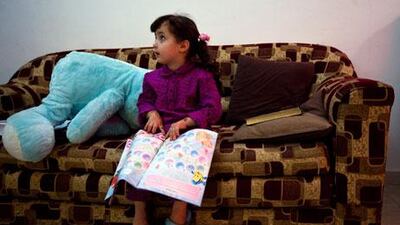ABU DHABI // Officially, three-year-old Leen Omar exists only as a name on a birth certificate.
She was born in the UAE in February 2007, but cannot leave the country, receive state services or even be registered for nursery school.
The problem is that the girl's father, OM, has left the country and his help is needed for her to obtain a passport.
The Abu Dhabi Court of First Instance and the Appeal Court have already ruled that he must provide financial support for the child and her mother, not abandon them, register Leen as his daughter and obtain all necessary immigration documents, including a passport for his daughter. Despite OM's initial denial, DNA tests have confirmed Leen is his child.
However, despite the most recent ruling, in March 2009, Leen's mother says nothing has changed. The girl's father is Jordanian-Palestinian; her mother is Syrian-Palestinian. But Leen's mother cannot get a passport for her child as she does not have a Syrian passport, only immigration documents for Palestinian refugees issued by the Syrian government. OM had sponsored Leen's mother to stay in the UAE when the pair were married. But she had no legal status after they divorced in August 2006. Out of fear of deportation, she gave birth to Leen in her home, which is illegal.
"I did not know anyone in my neighbourhood so I could not ask anyone for help," said the mother, who spoke under the condition of anonymity. "I also feared I would be deported. Had I been deported, my daughter would have been kept here in some orphanage because I would not have been able to obtain travel documents for her." She called her former husband before giving birth and asked him to take her to the hospital, but he refused. Because she provided "good reason" for giving birth at home, authorities gave her a birth certificate for her daughter.
"When I was pregnant, I did not want to pursue any legal action because I thought he suffered psychological issues," the mother said. She filed a lawsuit on August 23, 2007, six months after Leen was born, demanding he acknowledge her as his daughter. The mother asked the court to ban him from travel until court proceedings finished. OM claimed that the girl was born before the date of their marriage, however, Leen's mother told the judge the marriage took place in Syria in January 2006 but was only registered in July 2007. OM agreed to a DNA test, which showed he was Leen's biological father.
"Determining the parentage [of a child] follows the marriage contract and it is the legal right of the child, according to Sharia," wrote Chief Justice Dr Mohammed Mujahid. "To Islamic jurists, proving lineage is a mercy to the child so they are not abandoned." Although the father was banned from leaving the country, he used the court's decision to justify a trip to Jordan, saying he needed to process the necessary papers. That move, according to an independent lawyer, was illegal.
After OM left the country, Leen's mother visited the Jordanian Embassy several times asking for help. The embassy told her there was little they could do if the father did not support her application for a passport. "They told me even after 20 years, we cannot issue papers if the father does not show up," she said. Leen's mother said she did not know where to turn. Even simple child care has become nearly impossible because she must always rely on the availability of friends and family.
Before Ramadan she had to go to Syria to attend a family funeral, but Leen had to stay behind. The mother said she works from 8am to 3.30pm and from 6pm to 1am, and earns about Dh4,000 a month. Obtaining a visit visa for her mother to stay and care for her daughter is out of the question, she said. For now, she has either to leave Leen with friends or lock her in the house. "Officially, she is kind of non-existent," she said.
hhassan@thenational.ae

